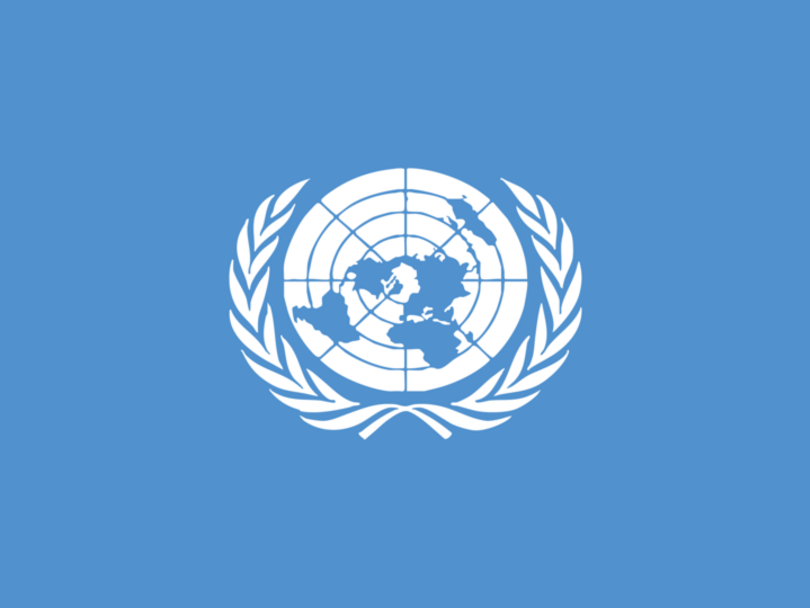Opinion: I learned about international power dynamics, relations at the UN

Touring the United Nations headquarters provided our columnist a chance to learn about global relations. He writes consuming media helps, but gaining understanding through lived experience is needed among young Americans. Sophia Burke | Digital Design Director
Get the latest Syracuse news delivered right to your inbox.
Subscribe to our newsletter here.
Over fall break, I decided to visit New York City, instead of taking a less practical trip home to Kansas City, Missouri. I’ve been to NYC quite a few times, so in search of something less touristy, I chose to tour the United Nations Headquarters.
After returning to campus, I noticed my friends didn’t particularly care about my visit to the U.N. Their disinterest reflects a greater general indifference to our nation’s global relationships among college students. Crucially, American students’ lack of global awareness stems from the way they are taught, specifically that the U.S. is more exceptional than other countries.
While I agree that students should consume international media as a remedy, this method isn’t a universal solution. From my own experience, I learn more about different perspectives and ideas not from news articles or professors, but through experience, such as my U.N. trip.
There, I gained new perspectives on power imbalances, notably through the U.N. Security Council and relations between the Global North and South nations. I also understand the U.N. is imperfect, but is an instrument to help us prevent the end of humanity.
Lately, we’ve seen the manifestation of stark power differences all around us. Just as power imbalances shape our daily lives and culture, they also influence the U.N. The permanent five nations of the U.N. Security Council have little in common which, along with veto power, has resulted in issues of protecting human rights. It’s been argued that the U.S. and its Western allies have far too much dominance and control over the United Nations, in comparison to African and Asian nations.
Despite these tensions, many college students detach themselves from what happens in geopolitical settings and the effects those power dynamics’ have on our world.
I didn’t truly understand the concept of Global North and Global South myself until I visited the U.N.: the “North” consists of countries with developed economies, contrary to the “South.”
The dominance of certain nations in the Security Council, for example, reflects a longstanding divide caused by the Global North having far more influence over international systems despite the Global South being most affected.
The speakers and administrators in a meeting I saw during my visit were from powerful countries, which happen to be in the Global North. Less-powerful nations, which happen to be in the Global South, were present, but clearly not in charge.
Unjust power dynamics are truly fascinating to see in person, and while it’s easy to point fingers at the U.N. for amplifying them, we must recognize the root of these imbalances.
Unjust power dynamics are truly fascinating to see in person, and while it's easy to point fingers at the U.N. for amplifying them, we must recognize the root of these imbalances.Sam Jacob, Columnist
I do agree that the U.N. is a broken institution that has reinforced the power of Western nations, but I always point out that the U.N. has done exactly what it was meant to do: prevent World War III, and those wars that have occurred since its founding have been successfully contained.
Dag Hammarskjöld, the 2nd secretary-general of the U.N.’s, once said, “The U.N. was not created to take mankind to heaven, but to save humanity from hell.”
Of course, there are issues relating to major power imbalance, but the U.N. has served out its intended purpose. There’s even progress actively being made to give the Global South more influence and reform the U.N. Security Council.
Leaving the U.N., I felt more hope than I had in a long time. I’d consider myself to be a pessimist, but the longevity of hope inspired by the U.N.’s founding made me realize that human beings aren’t inherently bad, and understanding the system is what can help us productively use it.
Humans are imperfect, full of flaws and can make disastrous mistakes, but if we can create a viable system of global cooperation that’s lasted more than 80 years and has prevented the destruction of humanity, there’s hope for the future.
It’s easy to ignore the world around us as American college students. In many ways, we’re encouraged to do so by the American education system. But there’s so much intrigue and complexity in the world around us that we miss out when we ignore it.
But because of the intrigue and complexity, there’s another incentive to miss out simply to avoid overwhelming geopolitical conversation. Most people learn better through experience.
Going to the U.N. was the best thing I’ve done to learn about the world around me firsthand, and I’d suggest the experience to those even outside of political science or international relations.
The U.N. is hope and power embodied in an imperfect system. It has ensured global cooperation and stability in a way that had never existed in history, and we should understand and use it as such.
Sam Jacob is a freshman majoring in political science and international relations. He can be reahced at stjacob@syr.edu.





